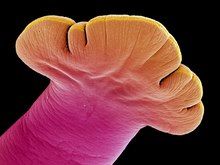Caryophyllidea
The Caryophyllideans are a group of tapeworms that infect fish and annelids (segmented worms) with a simple scolex or "head." Worms in this order only have one proglottid, which is believed to be the primitive condition for tapeworms. They are generally less than 10 centimetres long. Caryophillideans represent a unique type of tapeworm, such that they possess a monzoic, unsegmented, body, with only a single set of reproductive organs. For reproduction, this group of tapeworms undergo parthenogenesis, due to lack of functional sperm.
| Caryophyllidea | |
|---|---|
 | |
| Scientific classification | |
| Kingdom: | Animalia |
| Phylum: | Platyhelminthes |
| Class: | Cestoda |
| Subclass: | Eucestoda |
| Order: | Caryophyllidea |
In the Caryophyllidean life cycle, adults live in fish, who pass the tapeworm eggs in their feces. Annelids eat the eggs, where they hatch into oncosphere larvae that move through intestinal wall and become procercoid larvae in the body cavity. When the annelid is eaten by a fish, the tapeworm matures.
Catfish, suckers, and minnows are among the fishes that can serve as definitive hosts.
References
Špakulová, Marta, et al. “How to Become a Successful Invasive Tapeworm: a Case Study of Abandoned Sexuality and Exceptional Chromosome Diversification in the Triploid Carp Parasite Atractolytocestus Huronensis Anthony, 1958 (Caryophyllidea: Lytocestidae).” Parasites & Vectors, vol. 12, no. 1, 11 Apr. 2019, doi:10.1186/s13071-019-3420-0.